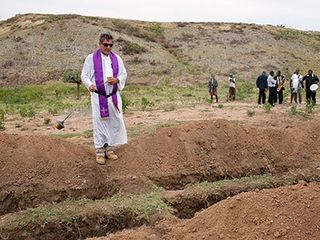Media
Fake News Has Real Consequences in Haiti
False radio broadcast fuels violent riot in cemetery for the destitute.
Posted September 29, 2019 Reviewed by Lybi Ma
Contributed by Father Rick Frechette, CP D.O., St. Damien Hospital, Port au Prince, Haiti
For the past year-and-a-half (not to mention the last 400 years), the Haitian people have been suffering deep political and social upheavals, often violent, caused by the decreased value of the local currency by half, and increased cost of living by a quarter.

Do the math with whatever income you have. (The majority of Haitians earn less than $800 annually.) You can now afford 25% of what you used to be able to buy. In addition, the severe shortages of fuel, the scandal over the funds that subsidized fuel, and the frequent and violent blocking of the roads, bring dramatic challenges to every single person in Haiti without exception.
People cannot live like this.
Now, imagine these challenges for St. Damien's Pediatric Hospital in the heart of Port au Prince. One issue is what to do with trash, when the company licensed to safely dispose of infectious/ dangerous waste is weeks delinquent in collection because of the fuel scarcity and violence. I won’t press your imagination, but I will say I have never seen so many maggots in my life.
A more urgent problem for us during the past ten days has been what do we do with our decaying dead (mostly children) when we have surpassed both the refrigeration space limits and the time limit that refrigeration works for the non-embalmed. The maggots become far worse.
The roads to our usual burial land in Titanyin was impassable for ten days because of the violence. On September 24, last Tuesday, I had to take action: I arranged to secure graves for 55 children and six mothers who did not survive childbirth at a closer cemetery, near the airport in Port au Prince. On that morning, my staff and I prepared and loaded the bodies into my small Polaris, which could dodge the burning barricades well.
We arrived at Drouillard Cemetery at our assigned time, 11:00 am, with 11 staff aboard to help with the burials. Except for a crowd of curious people at the gate, there was no incident. Our St Luke Foundation and NPH Haiti logo, work and reputation are well-known and respected.
After the bodies were unloaded, I wandered a short distance to offer a rosary for the people we were burying and all the dead at Drouillard. I had no idea there was a growing fury or the cause of the suddenly unruly crowd.
Here's what happened: Our humble burial for these children who found no peace in this life, and whose deplorable poverty made their lives painful, sorrowful and short, was now being manipulated for political purposes. A popular radio station, with scouts out on the streets full of burning barricades, sounded this fake news message over the radio waves as we buried the dead:
"We have information that St Luke Hospital is burying the bodies of the people killed for participating in manifestations."
This was meant to inflame hatred toward the President, among the people demonstrating against him on the streets. We were immediately seen as agents of the government, covering up the evidence of their attacks on demonstrators by dumping their victims in anonymous graves. All hell broke loose, and we could not calm the people with any words or efforts.
The 11 of us were separated into two groups, each having to fend for ourselves, shot at and pelted by rocks. It was not the people at the gate who attacked us, it was a three wheeled motorcycle used for merchandise transport, which had been hijacked to carry eight armed men in the wagon, followed by others on motorcycles, all armed. They were responding to the message heard on the radio.
I credit the rosary I clutched in my pocket for giving me the strength and wits to load six of us into my Polaris and drive a quarter-mile away to relative safety. I left my colleagues and tried to return for the five others, but it was not possible. A motorcycle bandit from another gang was passing by, and I paid him to go the quarter-mile to Drouillard and bring back news.
In a few minutes he was back. “See that smoke?” he asked. “That’s your truck burning.” Then, we both heard rounds and rounds of gunfire. I got sick to my stomach as I imagine Raphael, Cesar, Andre, Paschal and Renald full of bullets. A funeral is not supposed to produce a funeral. I felt again in my pocket for the rosary.
Immediately, my cell phone rang. Andre was calling with good news: he, Paschal and Renald had jumped a wall at the industrial park and were hiding, and needed me to come for them. I gladly did this at once. Now, there were only two of us missing, Raphael and Cesar.
Andre told me that the gang in a nearby neighborhood heard we were in trouble and came by the hundreds, shooting all the way, to help us. When the perpetrators ran off on foot to jump walls, the gang leader, Ti Hougan (little voodoo priest), blew a hole through the gas tanks of the 20 or so motorcycles, and threw a match on each as the precious and rare gasoline became the fuel for the destructive fire.
Within minutes, Raphael and Cesar were brought to us by Ti Hougan. While I greatly appreciate his help, the rosary in my hand made it clear who it was that saved us, and there is nothing “little,” at all, about Him and Her.
During all the commotion, the radio station reported confirmation with cemetery authorities that St. Damien has a 20-year history of burying the destitute dead at Drouillard, and we were authorized to do so that morning. They retracted the political interpretation, but it was too late.
Irresponsible journalism, such as radio emissions that contain false news, released without any verification, cause incredible harm to the fragile democracy in Haiti, and easily result in the loss of life and property. Fake news is also a devastating weakening of strong democracies, like the United States.
The privilege of being able to reach hundreds of thousands of people via the airways, has to be balanced by the highest obligations to responsible reporting. These obligations are summarized simply by the fact that what is reported must be true.
It is that simple, and that hard. Simple because truth is truth. Hard because, no matter what, not all truth should be spoken. There is so much to weigh in terms of justice, before speaking. What is true to say and what is just to say, need to be molded by what is wise to say.
Individuals and organizations, churches and businesses, can suddenly be dangerously and irreversibly affected by false reporting—even, in our case, with years of respected humanitarian reputation.
As an American Citizen, a Catholic missionary priest, and a founding member of two large organizations serving in Haiti for 32 years, I attest to the fact that under the present circumstances, it is daily more difficult and dangerous for us to do our work.
If our work—and that of many other missions and NGO's—becomes impossible, the consequences for those who count on us for employment, education, healthcare, spiritual evolution and human solidarity, will be nothing short of catastrophic.
I don’t write this to look for funds. I write this to try to save humanity.
Each of us needs to pledge in our lives to only speak what is truthful, non-partisan, non-manipulative. Truthful words, just words, wisely chosen, intended only to build up, correct, strengthen and affirm the human family. We must hold media outlets accountable to do the same.
Additionally, we all must hold ourselves to another very high standard: we must respond to the very worst of what we see and live through, with the very best of what is within us. Only this stops the deadly spread of hatred and revenge.
Please join me in the simple, yet hard, quest to be our best selves before it is too late.
Editorial update added on September 30, 2019:
The violence in Port au Prince has become so bad that the roads are blocked and the burning barricades do not allow staff to come to work to the hospitals. St. Damien has a limited supply of fuel. They need medicines, support to provide clean drinking water, food, fuel, and an ambulance. They need to hire more security guards, as well, to protect the hospital and an orphanage that houses hundreds of orphans. If you would like more information or to help, please visit the NPHUSA website.
Father/Doctor Rick Frechette serves as Nos Petits Freres et Soeurs (NPFS, French for “Our Little Brothers and Sisters”) Advisor and Ethical and Medical Consultant/Advisor for NPH International.




